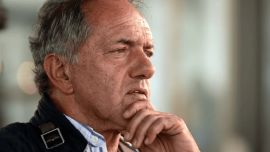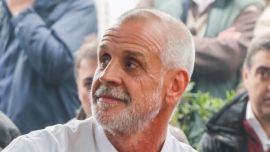This column was written on September 11, which worldwide might ring more bells as the 23rd anniversary of the 9/11 Twin Towers attack but in these parts is the rather more upbeat occasion of the Día del Maestro or Teachers’ Day. Since this column’s slug of ‘Beyond the headlines’ reflects the aim of trying to counter the urgent always crowding out the important like education, what better time to write about the multiple challenges facing that area?
Why is September 11 dedicated to teachers? Because it was on a September 11 (in 1888) that ex-president Domingo Faustino Sarmiento died in the Paraguayan capital of Asunción and Sarmiento is widely considered the father of modern Argentine education, on the strength of building on his previous ambassadorial posting in Washington to import 75 schoolmarms (of whom four were actually male but never let the facts stand in the way of a good cliché) from the United States, although this was the tip of an iceberg in founding schools nationwide. Last August 17 (the anniversary of independence hero José de San Martín’s death) this column asked why this country prefers to honour the ends of its great men – to that may be added in passing the question of why so many of those great men died abroad. Sarmiento in Asunción, San Martín in Boulogne overlooking the English Channel, the writers Jorge Luis Borges in Geneva (composer Alberto Ginestrera likewise) and Julio Cortazar in Paris (born in Brussels), tango legend Carlos Gardel in Medellín, Colombia, and this list could continue.
But enough of these digressions – schoolchildren are always being urged to concentrate so columnists should too. The educational debate generally centres on seeking the right policies to stop the rot – investing the famous six percent of Gross Domestic Product, an earlier start to schooling and longer hours, more technical input, more languages, etc. etc. But this debate needs to be turned on its head. The problem is not so much that politicians tend to take little interest in education as rarely an electoral game-changer – the problem is that the private sector is so indifferent to ensuring the groundwork for technical innovation and training skilled workers while all too many parents seem more on the lookout for glorified babysitters than genuine educators.
If education began with Socrates and his pupil Plato on two ends of a log, both learning and teaching are in crisis today. The constantly cited PISA scholastic aptitude tests bear testimony to the plunging comprehension and mathematical skills of schoolchildren moving ever closer to functional illiteracy and yet these increasingly ignorant students are digitally way ahead of their teachers – a prime reason for their growing inability to do simple sums in their heads is that the answer literally lies at their fingertips. One major dilemma facing education today: should an analogue education adapt full speed ahead to the new generations of a digital society or should it be offering a counter-cultural complement (as typified by City Hall’s recent decision to ban mobile telephones in classrooms)?
That question poses a direct challenge to the traditional “vertical” role of the teacher – it is perhaps no coincidence that both universal primary schooling (1884) and compulsory military service (1901) were the work of the same president (Julio Argentino Roca) in a concerted drive towards building an Argentine citizenry out of an immigrant mosaic. The world has changed dramatically in the last 140 years and yet this increasingly anachronistic model has remained almost frozen in time in all the decades since the National Teacher Statute of 1958, stubbornly defended by the teacher unions and by the provincial and municipal governments to whom education was decentralised during the Carlos Menem years in a cost-cutting move striving to make convertibility viable (thus creating a confusion of norms between the three levels of government). The digital gap between students and their teachers evidently dictates more “horizontal” learning processes.
Pay is the almost exclusive grievance of the teacher unions, quite legitimately so, but this also crowds out other key issues such as their training. Teacher pay can be found wanting both quantitatively and qualitatively. Paying decent salaries to schoolteachers seems impossible when measured against their sheer numbers – over 1.4 million, which means that every man, woman and child of every age in Argentina could be placed in a classroom and there would be a teacher for every class of 30. The United States does not even treble this army of teachers (3.8 million) with over seven times our population. This overpopulation is the result of accumulated layers of supply teachers with the maternity leaves of a highly female profession, among other reasons.
But the pay is also qualitatively flawed when the pay scales are based on seniority – it is precisely the older teachers most prone to leaving the education system frozen in time who are given greater incentives than more dynamic and innovative colleagues who deserve better. Teacher training is all too often an orphan of the educational debate with the centres perpetuating an archaic model – these centres are also very much state institutions with preparing the young for entry into the job market far from their focus.
Not much space left for university education (currently a hot issue in Congress) or postgraduate research – perhaps the subject of a future column. Here overpopulation is an issue too – that the University of Buenos Aires has 385,000 students speaks for itself. Nobody thinks of the Federal Capital as a university town like Cambridge but its student percentage is thus actually higher! While seeing the need to shift the burden of both higher education and scientific research from the public to the private sector, this columnist strongly questions the ferocious cuts in these areas – Argentina cannot be made to run before it can walk. But apart from easing this impatient or fiscally dictated approach, the CONICET research institute (created in 1958, the same year as the National Teacher Statute) needs to reorient scientific careers – researchers cannot be allowed to stay forever in their specialised bubbles and their “publish or perish” ethos needs to be replaced with perhaps longer-term work of more practical use to the productive sector.
To conclude this Teachers Day column, this Cambridge graduate will misquote Pink Floyd (the most important thing ever to come out of Cambridge outside its university) – “We do need education” and “Hey! Teacher! Don’t leave them kids alone.”



















Comments